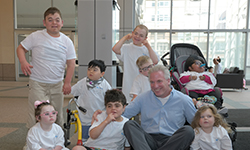HOW CAN WE HELP YOU? Call 1-800-TRY-CHOP
In This Section
‘The Birds and the Bees,’ Ultrasound-guided IV Line Placement, First CHOPS Syndrome Symposium, Social Media-based Parenting Program, Bystander CPR
 Take a look at who’s been in the press lately. This week we’re covering physician-endorsed parent-teen talks, the high rate of success with ultrasound-guided intravenous line placement, and how moms with postpartum depression are being helped with a social media-based parenting program.
Take a look at who’s been in the press lately. This week we’re covering physician-endorsed parent-teen talks, the high rate of success with ultrasound-guided intravenous line placement, and how moms with postpartum depression are being helped with a social media-based parenting program.
Physician Endorsed ‘Birds and the Bees’ Parent-teen Talk may Prove Effective
New research shows that brief parent-targeted interventions in the primary care setting can increase communication between parents and their teens about sexual and alcohol behavior. This method may serve as an important strategy for parents to influence adolescent behaviors and health outcomes.
In a randomized controlled trial conducted in a busy primary care pediatric practice, study participants included 118 parents and caregivers and their 14- to 15-year-old adolescents. Parents in the sexual health and alcohol intervention groups received coaching to discuss written materials encouraging parent-teen communication about sex or alcohol use, and their doctor endorsed these messages. Two weeks later, a health coach followed up with a phone call. The control group received standard medical care.
“Our study was not sufficiently long enough or large enough to test influences of parent-teen communication on adolescent behaviors,” said Carol Ford, MD, chief of the Craig-Dalsimer Division of Adolescent Medicine at Children’s Hospital of Philadelphia and lead author of the study. “However, we adapted and tested interventions to show improvements in both parent-teen communication and associated risk-taking behaviors. This suggests doctors and nurses may have an important role in guiding parents and teens to discuss sensitive health topics, like sexual health and alcohol use, in a way that helps teens make healthy choices as they grow up.”
Learn more in CHOP News, and see the study published in JAMA Network Open.
One and Done: Ultrasound-guided Intravenous Line Placement
Children’s veins are small and sometimes difficult to access during necessary medical treatments. But in a research study led by Alexandra Vinograd, MD, MSHP, DTM&H, an emergency medicine physician at CHOP, when caregivers used ultrasound to guide placement of intravenous (IV) lines in children with presumed difficult access, the clinicians had higher success rates on their first attempt, reducing the number of needle sticks in their young patients.
“In our study, ultrasound-guided intravenous lines remained in place longer than traditional insertion, without an increase in complications,” said Joseph Zorc, MD, emergency medicine physician at CHOP and co-senior author of the study. “These results may be used to update guidelines for intravenous line access in children in an effort to limit the number of needlesticks they experience.”
The researchers noted both nurses and physicians had high rates of first-attempt success. The rates were so successful among nurses, CHOP’s Emergency Department created an ultrasound-guided IV line placement training program.
Learn more at CHOP News. Read the original research in the July issue of Annals of Emergency Medicine.
First CHOPS Syndrome Symposium Held in Philadelphia
 Families from around the world attended the inaugural CHOPS syndrome symposium held in the city of Brotherly Love, where, in 2015, geneticists discovered the rare disorder. The condition’s acronym is derived from the variety of symptoms that characterize it: cognitive impairment and coarse facies (facial features), heart defects, obesity, pulmonary involvement, and short stature and skeletal dysplasia (abnormal bone development).
Families from around the world attended the inaugural CHOPS syndrome symposium held in the city of Brotherly Love, where, in 2015, geneticists discovered the rare disorder. The condition’s acronym is derived from the variety of symptoms that characterize it: cognitive impairment and coarse facies (facial features), heart defects, obesity, pulmonary involvement, and short stature and skeletal dysplasia (abnormal bone development).
At the time of discovery, only three patients, globally, had been identified, all of them living within a 200-mile radius of CHOP’s University City campus. Four years later, the number of patients has quintupled to 15. Nine of those patients and their families gathered in Philadelphia during July — in the same building where the causative gene was discovered — for a special event aimed at discussing the condition, meeting and bonding with other families who were on the same medical journey, consulting with a team of specialists for each of the major symptoms of CHOPS syndrome, and spending free time enjoying the city sites.
“Just seeing the happiness and excitement amongst the families meeting other families with the same diagnosis for the first time at this meeting underscored the importance of these breakthroughs for the individual families beyond the future hope of better therapies and treatment,” said Ian Krantz, MD, co-director of the Roberts Individualized Medical Genetics Center (IMGC) at CHOP and lead geneticist of the group of scientists who identified the rare condition.
See CHOP News.
Researchers Test Social Media-based Parenting Program for Moms with Postpartum Depression
Researchers are tapping into the power of social media to encourage women with postpartum depression symptoms (PPD) to participate in parent-coaching. A new National Institute of Mental Health grant supports the study led by James Guevara, MD, MPH, pediatrician and a founding member of PolicyLab at CHOP, and co-PI Rhonda Boyd, PhD, a psychologist in the Department of Child and Adolescent Psychiatry and Behavioral Sciences at CHOP. The researchers aim to address barriers women with PPD experience that interfere with their engagement in parenting interventions and accessing care.
The study team will measure how a novel social media-based parenting program they created based on a validated coaching intervention affects responsive parenting and child development. An advantage to using the social media format over traditional in-person group parent-coaching programs is that it gives women, especially those with limited financial resources, a convenient way to receive parenting education at a time when they may struggle to interact with others outside the comfort of their homes.
In a pilot randomized control trial reported in the Journal of Reproductive and Infant Psychology, the study team demonstrated the adapted parenting intervention delivered via a Facebook secret user group significantly improved parenting competence and decreased depression severity when compared to the in-person group. The social media group also had much higher attendance (83 percent) than the in-person group (3 percent). Study participants included patient families from the CHOP Primary Care Clinics at Karabots, Cobbs Creek, and South Philadelphia.
This new research will involve a larger group of 150 study participants divided into two phases that will compare the social-media based parenting program to online depression treatment alone. The researchers’ findings will continue to better inform public health interventions to develop effective parenting strategies that facilitate optimal child development for mothers suffering with PPD symptoms.
Learn more about their research in this Cornerstone Q&A with Dr. Guevara.
Disparities in Bystander CPR revealed in CHOP-led Research
African American children in the poorest neighborhoods are nearly 50 percent less likely to receive emergency bystander cardiopulmonary resuscitation (CPR) following an out-of-hospital cardiac arrest than white children in disadvantaged or more prosperous neighborhoods, according to research led by Maryam Naim, MD, pediatric cardiac intensive care physician in the Division of Cardiac Critical Care Medicine at CHOP. The novel findings appeared in the Journal of the American Heart Association.
While disparities in bystander CPR rates have been studied before in adults, this was the first time racial and socioeconomic factors have been analyzed exclusively in children in the United States. The striking disparity was found among black children living in primarily black neighborhoods with high unemployment, low education, and low median income. Approximately 7,000 U.S. children suffer cardiac arrests outside the hospital every year.
“Targeted CPR training for family members in lower-income neighborhoods could potentially improve bystander CPR rates,” Dr. Naim said. “As most bystander CPR is provided by family members, lower response rates are likely due to a lack of CPR training and recognition of cardiac arrests.”
In order to improve training and potentially close the gap of this disparity, Dr. Naim and her research team suggest teaching CPR to parents before a newborn is released from the hospital or during pediatrician visits.
See the CHOP press release and Reuters article for more information.
ICYMI
Catch up on our headlines from our Aug, 9 In the News:
- CHOP Researchers Continue Gene Therapy Advancements
- Does Your Patient Really Need That CSF Test?
- Exploring Successful Management of a Rare Vascular Anomaly
- Alex Fiks, MD, Named Director of Clinical Futures
That’s it for this briefing! Keep up with our news, stories, and updates in real time by following us on Twitter, Facebook, LinkedIn, or Instagram. Or subscribe to our newsletter to get an email sent every other Friday by signing up for Cornerstone.


